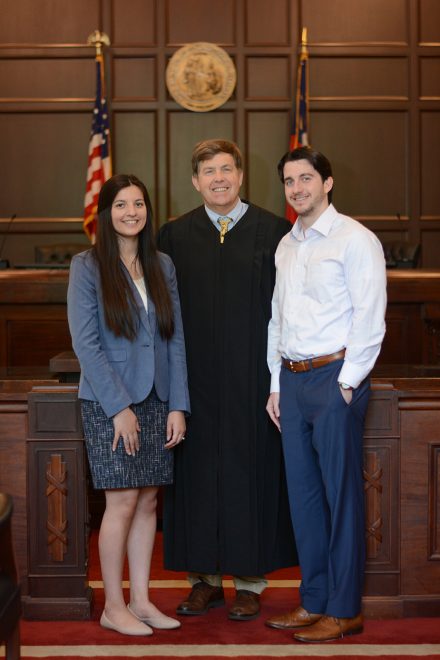An Elon Law residency-in-practice with the Hon. Christopher Dillon and his law clerk, Wesley Jones, introduced Tamara Gomez L'22 to a wide array of practice areas that interact each day with the North Carolina Court of Appeals.

Tamara Gomez L’22 enrolled at Elon Law with two years of professional experience as a paralegal for a Charlotte law firm.
During that time, Gomez discovered the many ways by which lawyers advocate for their clients. Having an older sister who also practices law likewise helped determine her career interests.
Still, nothing quite compared to her experience working with a judge on the North Carolina Court of Appeals. For someone who isn’t quite set on the area of law she intends to practice, working for an appellate court judge offers exposure to just about everything.
Gomez, a graduate of Queens University of Charlotte where she earned her Bachelor of Arts in political science, recently answered questions about working with the Hon. Christopher Dillon and his clerk, Wesley Jones, during a 2022 Spring Trimester residency at the North Carolina Court of Appeals.
This is the fifth and final profile in a series of conversations with Elon Law students in the Class of 2022 who completed their residencies-in-practice throughout the winter and spring trimesters.
***
Describe for me some of the work you’ve been able to complete through your residency with Judge Dillon and the Court of Appeals.
Most, if not all, of my days were spent reading, researching, and writing. My main responsibilities consisted of drafting bench briefs and working on draft opinions. I spent a good amount of time reading the appellant’s and appellee’s brief, any filed reply briefs, and the record. After my initial read, I spent time pulling the issues on appeal and verifying that the correct standard of review has been applied. I then located case law and statutes that are binding on a case and conducted a side-by-side comparison of each party’s arguments. I found it immensely rewarding that I was also able to include my legal opinion if the case should be affirmed, reversed, or affirmed in part and reversed in part.
Based on your experience, what’s surprised you the most about the practice of law and the appellate courts?
I was most surprised at how much the standard of review impacts a case. My first exposure to standards of review occurred in LMC III, but I did not quite appreciate how much these standards could impact a decision on appeal. A standard of review describes how much deference an appellate judge can give to a trial court. For example, conclusions of law are reviewed de novo so the appellate judge steps into the shoes of the trial court judge to review the case “anew.” However, an abuse of discretion is limited to reviewing whether the trial court’s ruling was manifestly supported by reason. I quickly learned that the standard of review may, and often does, impact whether the stated issue can even be argued on appeal.

Which of your traits benefited you the most in your approach to this residency?
I would strongly argue that my intellectual curiosity benefitted me tremendously in a judicial residency placement. Judges are tasked with analyzing issues that do not always perfectly align with relevant case law or statutes. For example, we must look to different judicial interpretation mechanisms to see what the language in a rule of a case, or a statute means, and how the law applies to specific facts. Sometimes the answer is clear. In many other instances, the answer is complex and muddled. A judicial residency demands intellectual curiosity because there must be a desire to see the facts from different perspectives that can certainly impact not only the current case at hand, but future cases.
How did your time with Judge Dillon and the Court of Appeals shaped your plans for after graduation?
I came to Elon Law with a goal to explore as many new areas of law as possible. I never would have imagined that my law school experience would uniquely include a residency placement where I could do just that—explore various practice areas! Judicial residencies are a great opportunity for those that have not yet solidified what kind of law they want to do after graduation because you get immediate exposure to a wide spectrum from civil to criminal law and everything in between. The attentive nature of Judge Dillon and his chambers has instilled great confidence in my legal writing and researching skills that I have no doubt will be applicable in any area of law I pursue.
Share one “quick tip” for current and prospective students as they prepare for their own Elon Law residencies or, more broadly, law school in general.
Be ready to adjust your learning and writing styles to a residency placement! Before this residency, I had the opportunity to work in corporate law, civil litigation, criminal, and administrative law. However, this placement is unlike my other experiences because judicial externships allow you to view the world from a judges’ lens. Each chamber also consists of distinctive judges that have established their respective legal writing styles. Particularly, I realized that legal writing in chambers is clear, concise, and straight to the point.
Unsurprisingly, state appellate courts receive a vast number of trial court decisions, so it was my job to provide a succinct summary for Judge Dillon. I never realized how wordy my writing was until I received my first feedback review and since then I have worked tremendously to condense my legal writing to fit my chambers. Elon Law has given you all the tools you need to succeed in a judicial residency, so be ready to adjust and apply those skills as you see fit for any chambers.
About the Residency-in-Practice Program
Elon Law’s highly experiential 2.5-year curriculum requires every student to complete a full-time, course-connected residency-in-practice during their second year of study. Through faculty-directed residencies, students cultivate essential skills, values and judgment to help them excel as attorneys and deepen their understanding of various practice areas, while enabling attorneys to convey wisdom about the legal profession.
Students work 32-36 hours a week over a 10-week trimester with a judge or attorney supervisor and a faculty member to create and implement a learning plan that develops an increased proficiency in professional legal skills and in an area of law practice.


